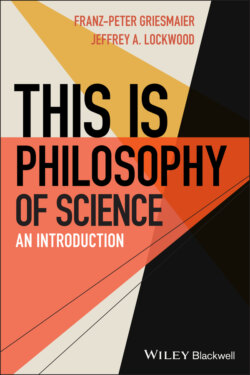Читать книгу This is Philosophy of Science - Franz-Peter Griesmaier - Страница 30
2.3.2 Operationalism
ОглавлениеAn entirely different answer to the puzzle about hardness (and related ones) is that the measurement procedure actually defines our scientific terms in the first place. This view is called operationalism. According to it, measurement procedures give meaning to otherwise ill-defined predicates (those are the terms used to refer to properties). A famous example is the predicate “intelligent.” An operationalist would claim that the term “intelligent,” as ordinarily used, is unsuited for scientific purposes. We simply don’t know whether or not it applies to the behavior of a person, because we don’t have sufficient agreement between researchers as to what property is singled out by the term. Thus, we define “intelligent” more precisely as standing for a property which is causally responsible for the performance of a person in a standardized intelligence test. Such tests deliver numbers on a scale. The view is that those numbers may or may not measure any property we were interested in before we started to theorize, but rather single out a property as corresponding to a precise predicate that is scientifically useful. On this view, hardness may be a pretheoretical property, corresponding to different human experiences of resistance to pressure, but the “scientific hardness” of a sample of material is its location on the Mohs scale. End of story.
A form of operationalism was influential for Swiss physicist Alfred Einstein’s development of the special theory of relativity; he also insisted that legitimate scientific concepts have to be defined by appropriate measurement operations. Thus, the meaning of “space” is given by the operations we apply for measuring length, and that of “time” by the operations for measuring duration. We will revisit this issue in Chapter 11. However, as a general theory of the meaning of scientific terms, operationalism is inadequate, as can be shown by the following consideration.
First, if methods of measurement indeed fix the meaning of a predicate, then there can be no such thing as an incorrect method of measurement, because there is simply no room for a mismatch between a property and how it is being measured – the former is defined in terms of the latter! For example, if intelligence is defined in terms of the standardized test with which we measure it, the test cannot fail to measure intelligence correctly. The measurement methods are correct as a matter of convention. But, second, it seems that it is possible to develop methods for measuring some quantity that are wildly inadequate. For example, measuring hardness by shining lights of various colors onto minerals seems clearly wrong, even if we supply a “scale” (looking prettiest under color 1 (red) = hardness 1). Seeing that this “measurement” of hardness is just crazy clearly shows that there is a well-(enough)-understood notion of hardness even before we try to measure it.
This seems to support a sort of realism about the properties we try to measure, in the sense that measurement is the estimation of the magnitude of an independently existing property. In particular with respect to properties such as length, weight, and duration, for example, a realist stance seems most plausible. That is, there are real, observer-independent features of the world. It certainly seems to be the case that objects have a determinate length independently from our attempts to measure it, and processes have an equally determinate duration. But as we will see later, things are actually not all that clear cut. It turns out that what length we measure depends on the motion of the object relative to the observer. This phenomenon is called length (or Lorenz) contraction, and we discuss it in some detail in Chapter 11. However, even with such simple properties such as mass, we can already notice that its measurement is at least in some cases heavily influenced by already existing background theories. Let’s have a brief look.
